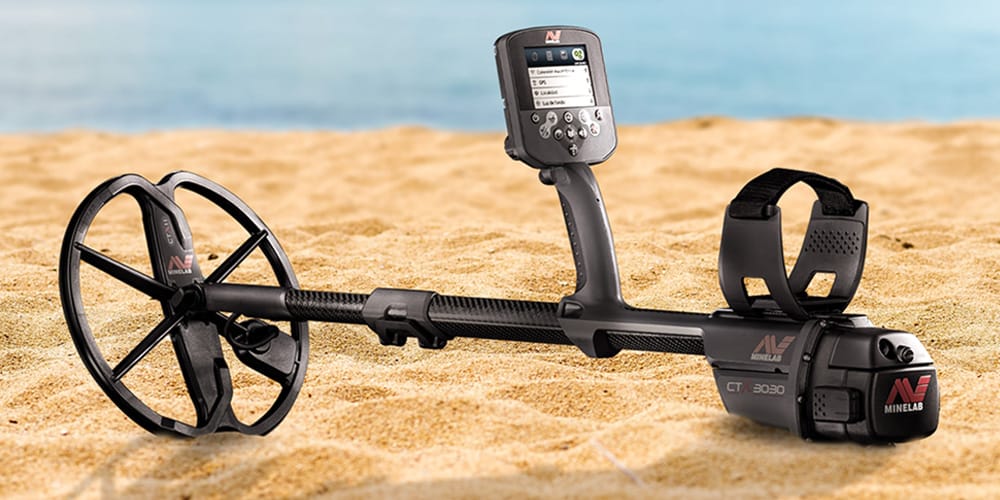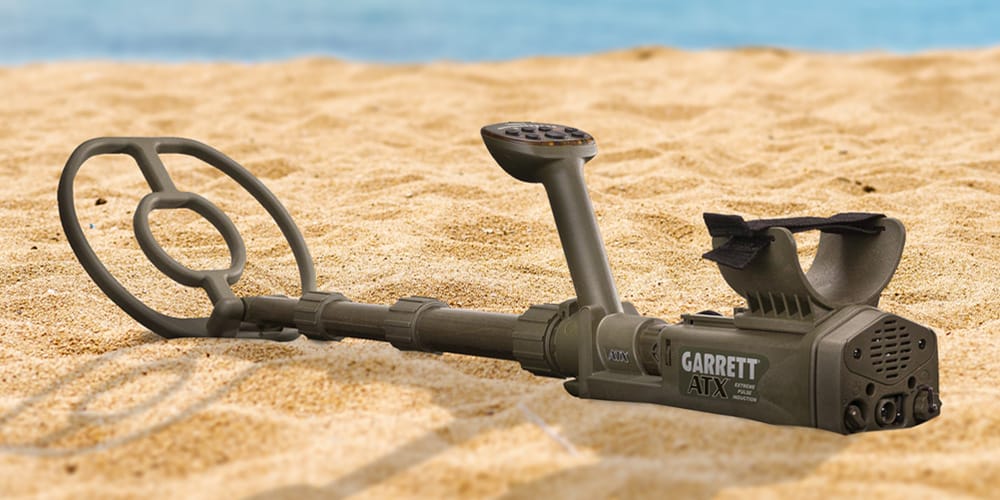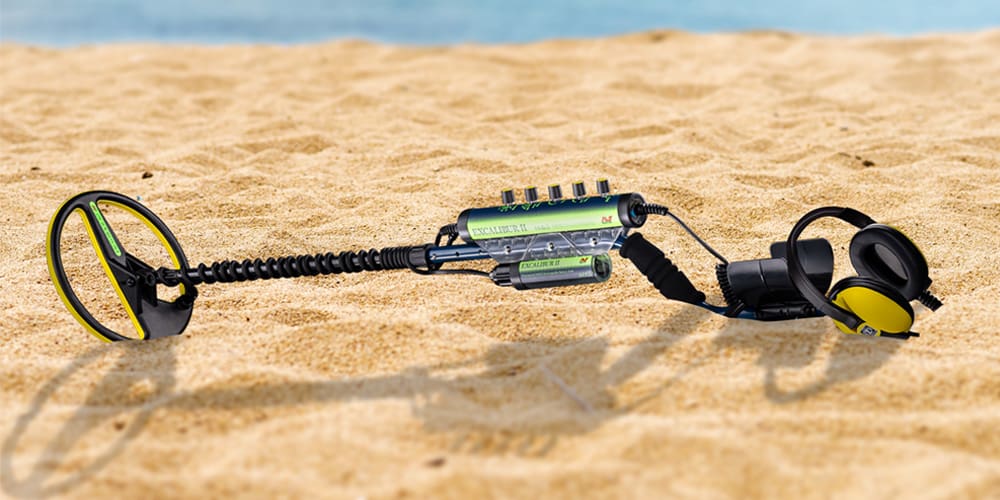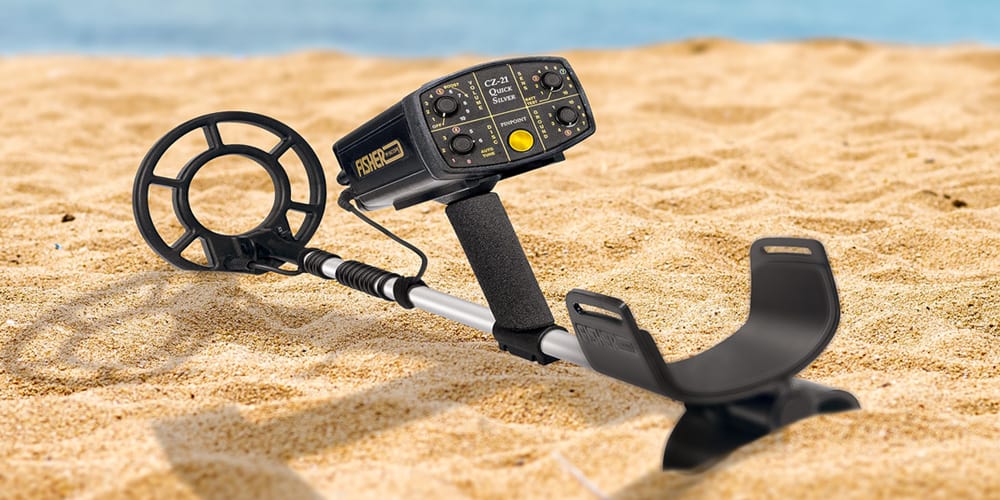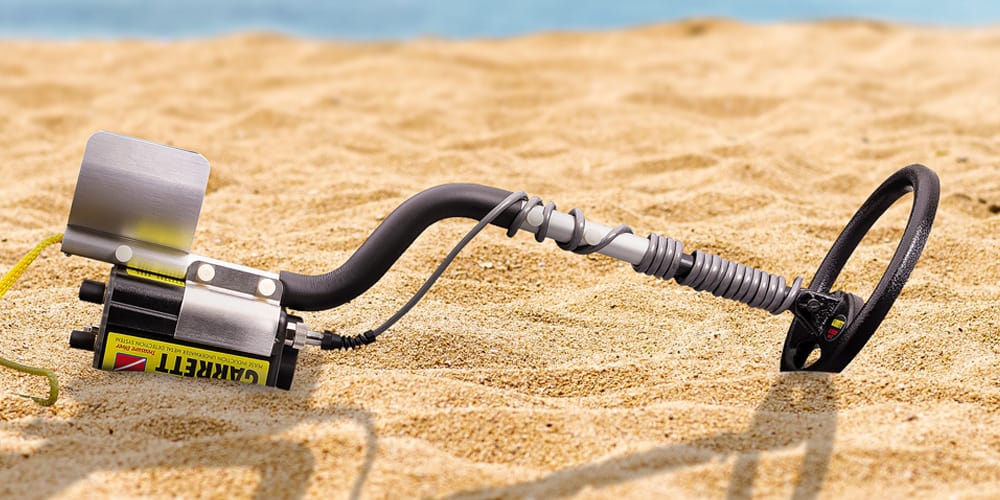Only certain metal detectors will perform well on the beach, as most cannot handle the high mineralization of saltwater. The Minelab CTX 3030 is my top pick for the beach. It’s the perfect metal detector if you want to hunt both land and sea with the same detector.
This guide will walk you through the best metal detectors for beach hunting.
Best metal detectors for the beach in 2024
- Minelab CTX 3030: best beach metal detector. Our top pick
- Garrett ATX: superior depth but not as great discrimination
- Minelab Excalibur II: best for deep saltwater and diving
- Fisher CZ-21: great for deep water and diving, but not target ID
- Garrett Sea Hunter Mark II: also recommended, but lacks discrimination features
- Minelab Equinox 800: honorable mention for wet and dry sand
- Nokta Anfibio Multi: honorable mention for general beach detecting
- XP ORX: honorable mention for general beach detecting
- Aquascan Aquapulse AQ1B: best for serious divers
Now that we have a few of the basics out of the way let’s talk about the pros and cons of each of my recommendations.
Minelab CTX 3030
What we like:
- Superior discrimination and target ID
- Great all-purpose detecor; don’t need to buy separate land machine
- Lots of coils available
- LCD display
- Digital Target ID
What we don’t like:
- Price
- Can’t be used for diving
Garrett ATX
What we like:
- Sensitivity Control
- Pulse Delay (ground discrimination)
- PI machine that can ground balance
- Can handle extreme mineralization
- Military-grade build quality
What we don’t like:
- Price
- No visual screen
Minelab Excalibur II
What we like:
- Excellent iron discrimination
- Multi-frequency machine that can also be used for diving
- Very accurate tone ID
What we don’t like:
- Iron null delay can make you miss good targets
- Hardwired headphones
- Requires additional kit to hip mount
- No tone on deep, faint signals. Just threshold change.
Fisher CZ-21
What we like:
- Fast response time
- Audio boost mode
- Pinpoint button
- Easy to hip mount
- Clear tone on deep, faint signals
What we don’t like:
- No threshold adjustment
- Concentric coil
Garrett Sea Hunter Mark II
What we like:
- Interchangeable coils and headphones
- Has large 10×14 accessory coil
- Independently sealed battery compartment
- Pulse Delay for heavy iron beaches
What we don’t like:
- No volume control
Buyer’s guide
This guide will teach you what to look for and help you choose the best beach detector for your budget. Contrary to what some people may claim on certain online metal detecting forums, not all metal detectors can be used at the beach.
I can’t tell you how many times I get asked the question, what detector should I buy that can handle salt, is waterproof, can be used anywhere, and under $1,000? It doesn’t exist. This article will help you to understand why that’s the case, and put you on the path to choosing the best metal detector for the beach.
So why isn’t there an entry-level all-around metal detector under $1,000 that can be used in saltwater? I know when the average non-detectorist pictures someone metal detecting, they see an image of a person at the beach. So how could it be that most detectors aren’t optimal for beach use? It comes down to technology and the design of the detector. Most detectors are built for all-around treasure hunting on land and are ‘single frequency’ machines.
In this guide
- Best metal detectors for beach
- Beach metal detector technology
- Waterproof vs. Submersible Detectors
- Searchcoil Size
- Accessories
Beach metal detector technology
The type of metal detector technology you choose to use on the beach is extremely important. Single-frequency VLF (very low frequency) machines cannot handle saltwater, period. Ok technically you can still use them on salt, but you’ll find that you have to hunt with extremely low sensitivity settings which dramatically limits your depth capabilities. You’ll also find that the target ID can be wildly inaccurate and give off false signals. Metal detecting in and around saltwater requires completely different technology than an all-around land machine – either ‘multi-frequency’ or ‘pulse induction.’
Now let me be clear, this does not apply if you’re just looking to hunt on dry, white sand at the beach. If you’re just planning to detect on dry white sand, then your best bet is to read one of our other guides:
But serious beach hunters know that once you scan the ‘towel line,’ most of the good finds will either be in the surf or the water itself. So if you ask me, your detector of choice should be able to handle all areas of the beach, not just the towel line.
The type of metal detector mentioned in this article is either multi-frequency or pulse induction (PI).
Let’s talk about the main differences between these two technologies, as well as some of the other things to look for in a beach detector.
Multi-Frequency
Multi-frequency machines tend to be more expensive than a single frequency. It’s a technology used in the higher-end Minelab FBS detectors like the E-trac and CTX 3030 (other brands also use MF technology). In a nutshell, these detectors transmit multiple frequencies simultaneously which can penetrate minerals like salt, give you better depth, and more accurate target ID. They look and feel a lot like single frequency machines; however, the technology is far superior any way you slice it (not just for beach hunting).
Pulse Induction (PI)
Pulse induction detectors on the other hand look and feel very different than single and multi-frequency detectors. These are considered specialty machines and used by serious beach hunters and gold prospectors. While PI detectors can get you better depth at the beach, I would not recommend one if the beaches you want to hunt have a lot of trash (or black, iron-rich sand) since it’s much harder to discriminate.
Which Technology is Better?
So which one of these technologies is best for detecting at the beach? Neither is better, but they’re very different. Here are some reasons to opt for a multi-frequency versus a PI:
- You only want to own one metal detector and use it for all types of hunting – not just at the beach.
- You need to be able to discriminate targets and eliminate trash signals.
- You want to hunt on beaches with lots of black sand (iron). A PI will struggle to discriminate that much iron.
Here are some reasons to opt for a PuIse Induction versus a multi-frequency:
- You already own (or will own) another metal detector for land.
- You only want to use it on beaches (or gold nugget prospecting).
- You will be spending most of your time in the surf and/or water.
Detectorists who are serious beach hunters will own two separate metal detectors – one for the beach, and one for everything else. Once you choose the technology you want to go with, here are a few other features to look for:
Waterproof vs. Submersible Detectors
Nearly all metal detectors have waterproof, submersible coils. But the rest of the detector (mainly the control box), is NOT even water-resistant and cannot be used underwater.
I always say if you’re going to hunt in any kind of water, get a fully submersible, underwater metal detector. Even though you’re confident you can keep the control box out of the water, it’s way too easy to get hit by an unexpected wave when digging a target. And then your detector is toast. But since you’ll be following the sound advice of this article when choosing your beach detector, all of the detectors I recommend are fully submersible.
You’ll notice that I leave out detectors like the Minelab Safari, Explorer, and E-trac in my recommendations. While these will perform very well in saltwater, they are not waterproof. So if you want a Minelab multi-frequency detector, you’ll have to step up to the CTX 3030 (my personal machine of choice).
One final note on this topic is that submersible detectors are always rated by depth. For example, maximum submersion of 10 feet. Some detectors made for scuba diving can go up to 200 ft. So be sure to take that into consideration when choosing your detector.
Searchcoil Size
Stock coil size is often ignored when selecting a detector for the beach. While there are lots of reasons why to choose one size over another, for this article we’re going to stick to weight, surface tension, and sweep area.
Large Coils
Larger coils will most often give you better depth and a greater sweep area so you can cover more ground faster. But there are tradeoffs – extra weight being a major factor. When I change my 11” double-D stock coil to the 17” on the CTX, it doesn’t take long for my shoulder to start screaming.
Manufacturers design detectors to be well-balanced with the stock coil – so the weight is evenly distributed. But when you switch to a larger coil, that weight balance goes out the window and you will usually feel the full force of the larger coil. So while the incremental weight between the 11” and 17” might not seem that much on paper, you will absolutely feel in out in the field.
If you’re on a relatively clean beach and want to hunt for more than an hour, I’d highly recommend you get a chest harness. I use the Minelab Pro-Swing 45, but there are others on the market that do the trick.
The other downside to the larger coil is when you’re in the water. The larger the coil, the more surface tension/resistance you’ll feel when swinging back and forth. Unfortunately, a chest harness won’t help with this. So if you want to use a large coil in the water, you better start doing shoulder lifts at the gym! You should also consider an ‘open coil’ which has much less surface resistance.
Small Coils
Using a smaller coil in the water while wading is also a good idea because you’ll get more accurate pinpointing which is a big help when you can’t see the bottom of the ocean floor.
Another reason to opt for a small coil at the beach is if you’re hunting very trashy beaches where target separation is a significant factor.
Accessories
Now that you have a better idea of the detector to buy let’s talk about some accessories you should consider.
Sand scoop
Sand scoops are quite possibly the most important accessory for beach detecting. As with most things, there isnt any ‘best scoop.’ But some things to consider are:
- Long handle vs. short handle, vs. no handle (or very short handle). The biggest factor here (for me anyway) is how much you like your back. In other words, is easier, pain-free digging enough to justify carrying around a bigger scoop all day? For me it is.
- Type of metal (I recommend aluminum). Other scoops use stainless steel.
- Build quality. Some scoops are lighter duty for dry sand whereas others are heavy duty and can handle the extra weight of wet sand.
Because I hunt both wet and dry sand, and I don’t like back pain, I use this long-handled, heavy duty aluminum scoop from RTG.
Headphones
Quality, waterproof headphones are super important on the beach because you need to be able to noise-cancel the wind and crashing waves to hear faint signals. And usually, those weak signals are the ones you want because they’ve likely been missed by detectorists who bought their detector BEFORE reading this article 🙂
Just be sure your headphones are waterproof. Just because you purchase a machine like the Garrett AT Pro (which is fully submersible), doesn’t mean the headphones are also waterproof!
Mesh pouch
A mesh finds pouch is a must if you’re planning to do any wading. It will prevent water from filling up your pouch and potentially wash out your finds. Just be sure to get a quality pouch with tiny holes, so your finds don’t fall out.
Chest or shoulder harness
A chest harness is a no-brainer if you’ll be spending more than an hour at the beach using a large coil. Your shoulders will thank you.
Pinpointer
Pinpointers are not as valuable in beach detecting as it is for land (assuming you’re using a sand scoop). For land hunting, it’s the most important accessory you can own. Most beach finds will be coins and jewelry and will be larger than the holes on your scoop. And digging two scoops instead of one in the sand isn’t that big of a deal. The only time you’ll need to use your pinpointer is on smaller targets like earrings that may slip through the holes in your scoop.
Final thoughts
I want to reiterate that this article is geared toward people who are serious about beach hunting; not for casual beachcombing. If you’re just planning to go metal detecting on the beach a few times per year on your summer vacation, then a dedicated beach detector probably doesn’t make a lot of sense – unless you have the budget.
I hope this article was helpful, and please feel free to ask questions in the comments below. Happy hunting! Oh and don’t forget to wear sunscreen…
Already chosen your detector? Time to check out this article on beach metal detecting tips.

